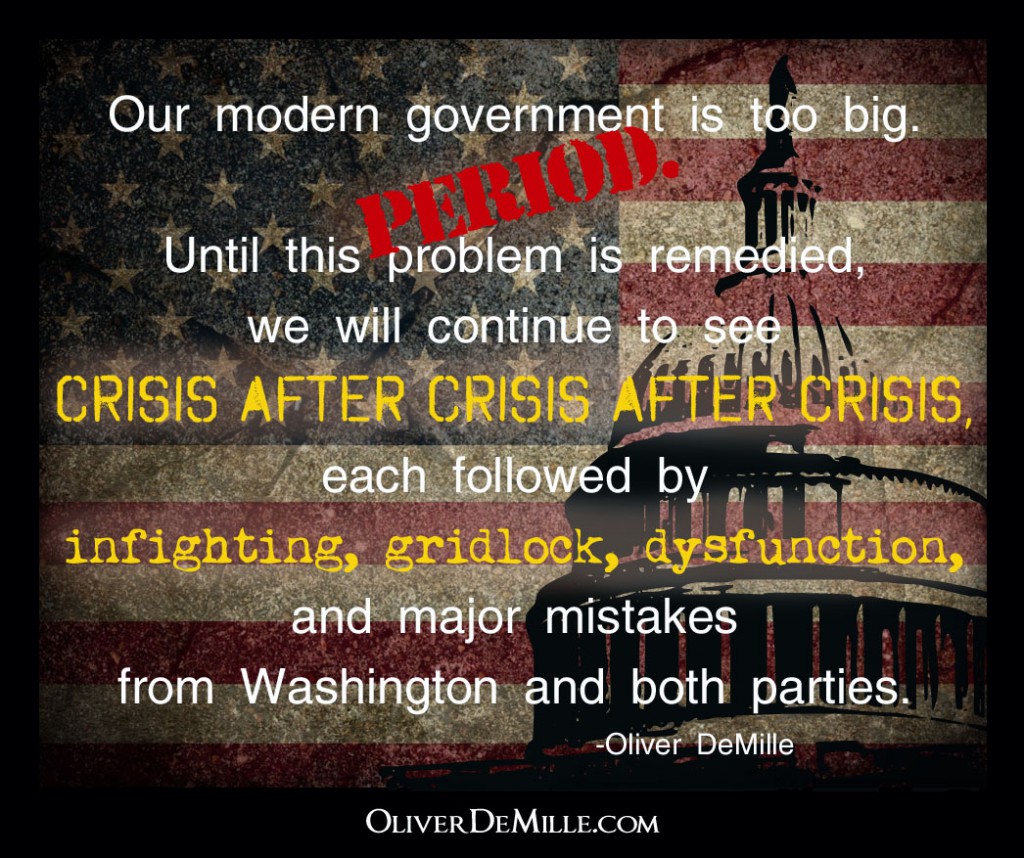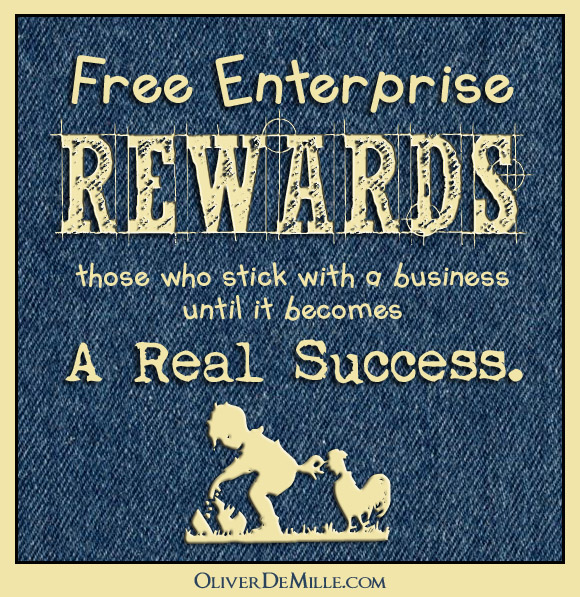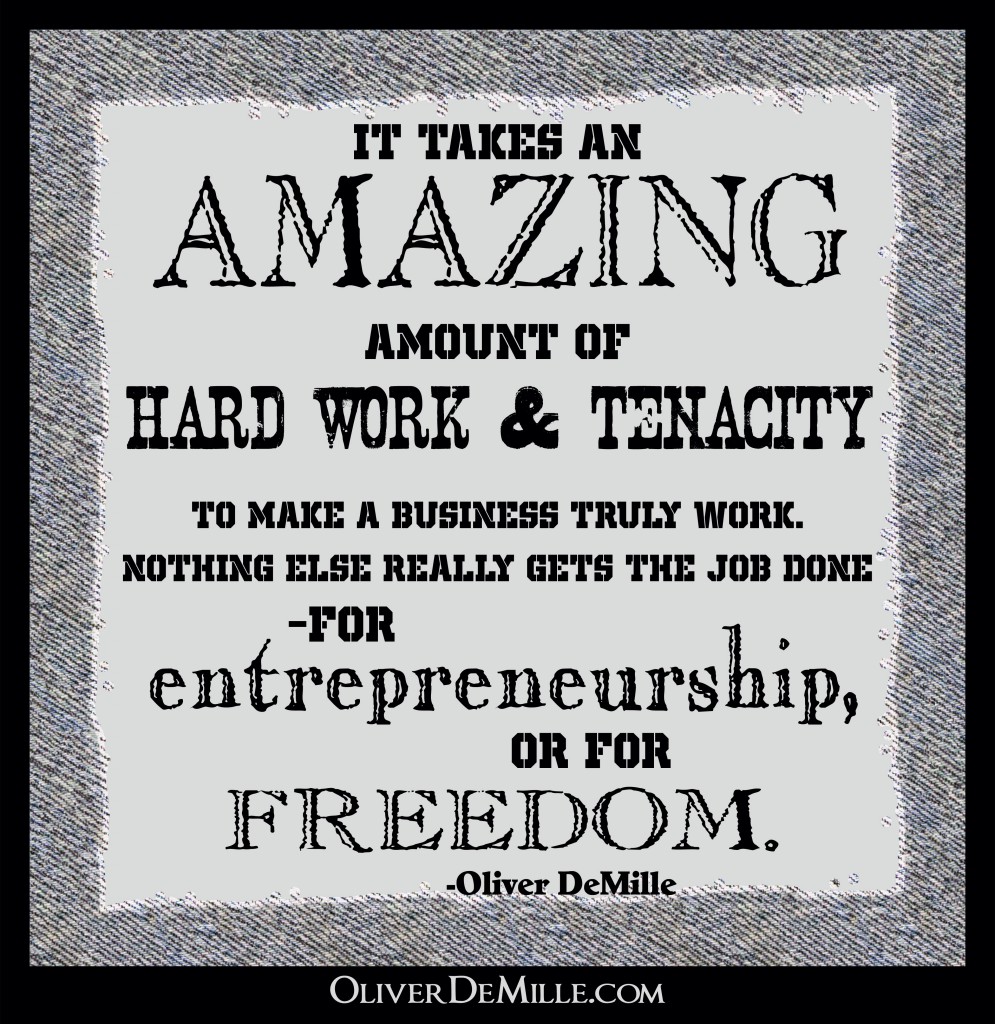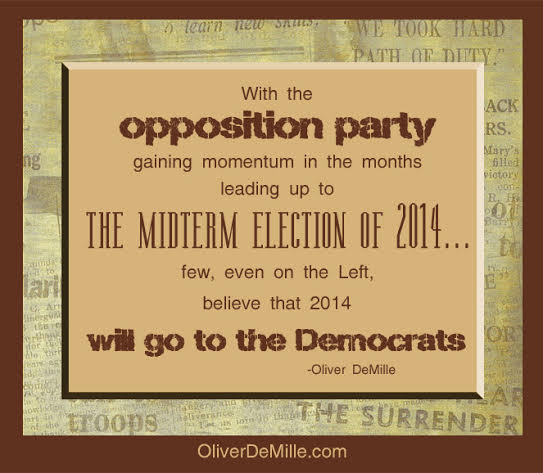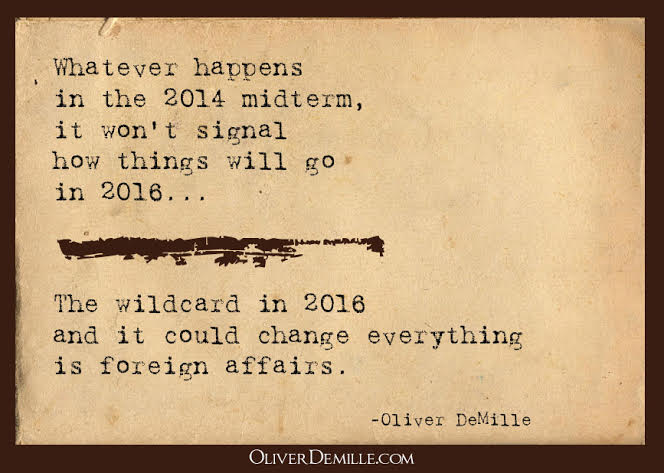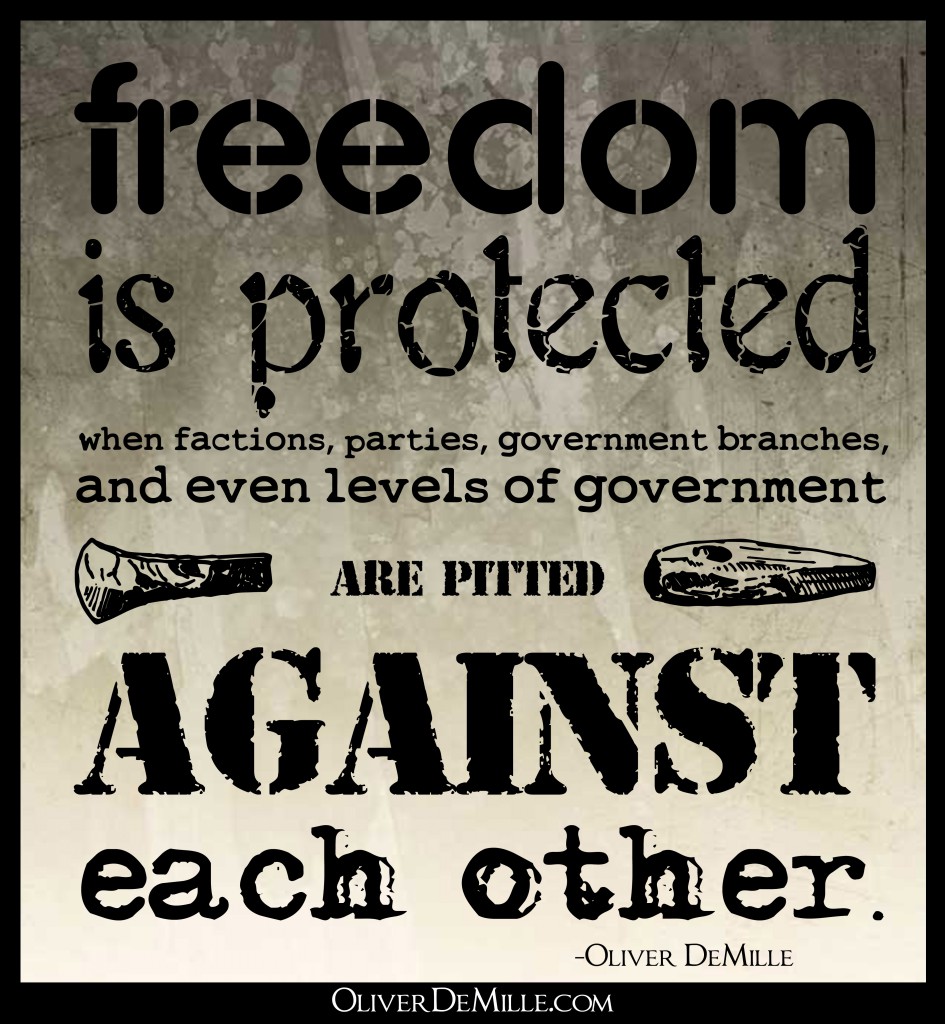The “BIG” Problem by Oliver DeMille
July 30th, 2014 // 7:53 pm @ Oliver DeMille
The Wrong Size
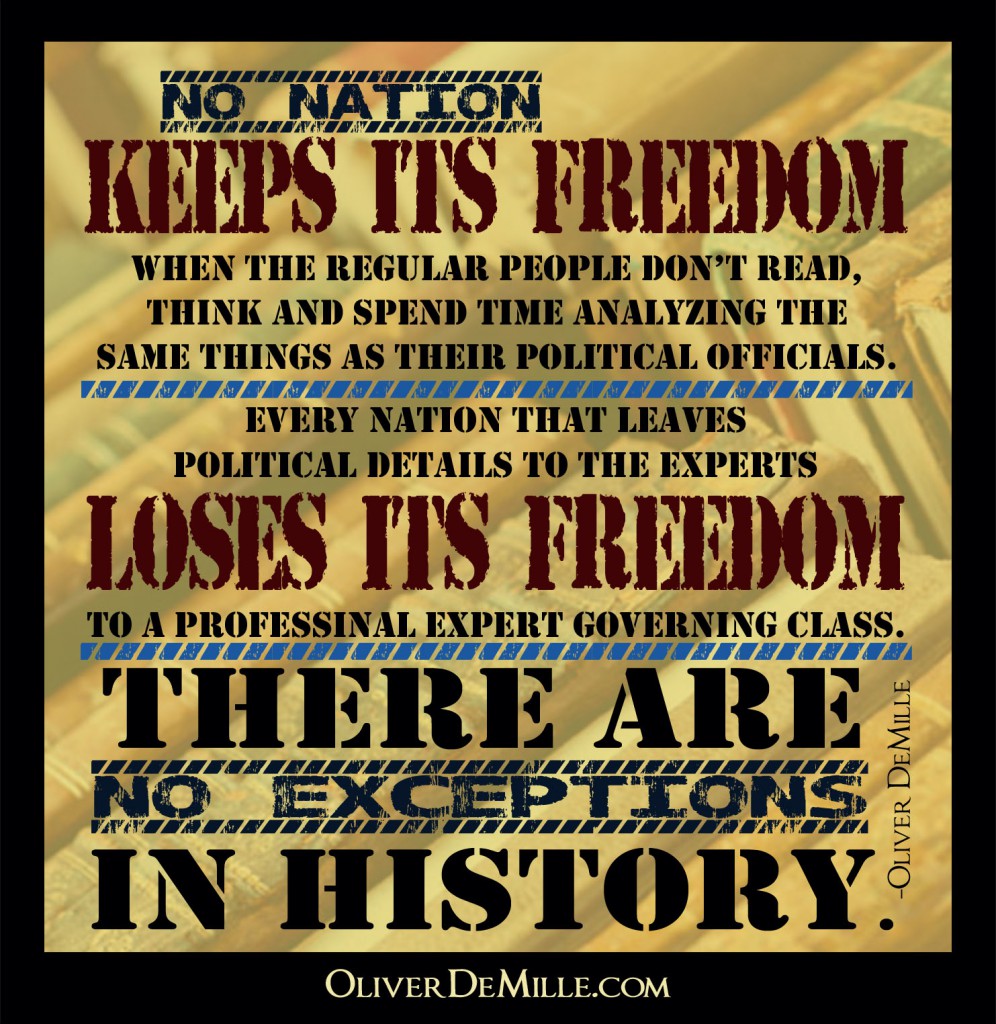
The “BIG” problem isn’t just hugely important, it’s also the incredible set of challenges that are created when any institution, organization, or endeavor is just plain too big. This problem is predictable, and therefore solvable, but only if the right people are keeping an eye on the right things.
Specifically, our modern government is too big. Period. Until this problem is remedied, we will continue to see crisis after crisis after crisis, each followed by infighting, gridlock, dysfunction, and major mistakes from Washington and both parties. As long as the government tries to do too much on too big a scale, it will continue to do many things poorly.
In fact, our government reached this turning point (too big to be efficient) in the late 1960s. As Micklethwait and Woolridge put it: “By the 1970s, the U.S. government seemed to be spoiling everything it touched…” (Foreign Affairs, vol. 93, no. 4, p. 126) And the size and scope of its endeavors have more than quadrupled since.
The Two Crises
This has created two overarching crises that never seem to dissipate. In fact, they’ll continue to fester and grow as long as the government grows. First, a government too big to be effective or efficient tends to infectiously weaken the effectiveness and efficiency of everything it touches—and at the same time it habitually tries to touch more and more. This dull, inevitable march to control more parts of life and the economy (and inadvertently make them all less effective) has killed every great world power in history.
Its occurrence in the United States is now the defining characteristic of our century—for the whole globe.
Second, the bigger the government gets once reaching this point of inefficiency, the less it fulfills its primary mission. For the framers, the role of what they called the “general government” (meaning the federal government, what we now usually call the “national government” or even, tellingly, “the government”), was national security and the protection of freedom.
The framers saw no other role for Washington. It’s raison de etre was to protect inalienable rights and defend the nation. Nothing else. In fact, the Constitution was designed specifically to ensure that it did nothing else. Worried that they hadn’t quite made this certain, the founding generation then added the Bill of Rights to make absolutely sure that the federal government only did these two things.
Then, just in case they hadn’t made it clear enough, they added the Ninth Amendment to the Bill of Rights. But even then they worried that they hadn’t done enough to limit the federal government. So they added the Tenth Amendment as well: “The powers not delegated to the United States by the Constitution, nor prohibited by it to the states, are reserved to the states respectively, or to the people.”
“We want the federal government to protect inalienable rights and maintain national security, and do nothing else!” they tried to say (the Constitution). Then, “And we mean it (the Bill of Rights). We really mean it (the Ninth Amendment). Seriously, we truly, totally, emphatically, mean it! (the Tenth Amendment).”
Richard A. Epstein wrote: “…the two central concerns of constitutional law” are “institutional structure and individual rights.” (Harvard Journal of Law and Public Policy, vol. 37, no. 3, p. 705) The purpose of institutional structure is to secure individual rights, not vice versa.
The People or the Government?
But when the focus of government becomes too big, well beyond the Constitutional powers of protecting rights and maintaining the national defense, the individual rights of the people become a resource to be bargained, traded or sacrificed in the name of institutional structure. “Think not what you can do for your country, but what your country can do with or without your consent for itself,” becomes the operating principle.
The people, the individuals, are forgotten in this new arrangement. They become a cypher, expendable, unimportant. Not citizens but voters. Not a nation of, by, and for the people, but now people for, by, and of the nation (meaning whatever Washington says). In other words, an aristocracy, where elites run the nation and control the people who live in it.
This isn’t the founding model of Americanism at all. It’s the opposite. It’s top-down government, not Jefferson’s bottom-up democracy. As such, it is fundamentally authoritarian, not a self-governing republic. This has created two natural results: national decline as the world’s sole superpower, and the decline of individual freedoms.
Both declines will continue as long as the “BIG” problem (the government is too big) persists.
The Cause
But what can be done, realistically? The federal government can be held to its Constitutional boundaries. It can be limited to national defense and the protection of the inalienable rights of its citizens. This is why the government was created in the first place, and when it tries to do anything else beyond these two roles it is both unconstitutional and also destructive to freedom, prosperity, and happiness.
The people still have the power to remedy this, in every election, if they’ll choose to vote wisely.
Note that nearly all nations in both the free and the authoritarian world are facing the “BIG” Problem. Following America’s lead, or in some cases simply striking out on their own, modern governments are drastically expanding—not sticking to their wise or constitutional limits. For example, the debt of governments around the world “…reached $50.6 trillion in 2013, compared with just $22 trillion in 2003.” (Ibid. p. 130)
At this rate, the fall of individual freedoms to the “BIG” Problem is all but ensured.
This trajectory isn’t surprising in the authoritarian nations, where elites openly rule the masses. But in the free nations, it is a relatively new development, one that began in the United States with the advent of the GI Bill after World War II. Before this time, education generally emphasized the classics and the great skills of deep reading (e.g. The Federalist), writing and thinking.
When the government began massively funding higher education, schools changed their emphasis to job and career training, and subsequent generations of Americans stopped learning to read. Of course, they gained literacy, but as a nation we lost our high level of what I’ve called Leadership Education and what E.D. Hirsch called Cultural Literacy—a deep understanding of the same things our leaders read and think about.
In fact, before 1945, the primary focus of American education was for each child, youth and citizen to read the same books and think about the same ideas and questions as their Presidents, Senators, Judges, and leading CEOs.
Allan Bloom called this momentous shift away from cultural literacy “the closing of the American mind,” and he warned that unless we reversed this trend democracy was doomed. We didn’t reverse it, and as a result, as mentioned above, “By the 1970s, the U.S. government seemed to be spoiling everything it touched…” (Op Cit)
In the 2010s, the dearth of leadership education is a wholesale national crisis. Very few people know how to really read the fine print of government any more. In such situations, rule by elites is the only historical norm.
If we are merely voters rather than engaged citizens, we vote poorly. We are swayed by media, photogenicism, and campaign popularity contests. We ignore the fact that candidates lie, or more accurately that once in office they routinely fail to live up to their campaign promises.
We become a nation of children, led around by our elite handlers, rather than a nation of adults who closely scan government actions and keep our politicians and their policies on a tight leash.
Again, the fundamental problem is that we aren’t in the habit of reading or thinking like leaders. For example, consider the following commentary from a contemporary source:
“Freedom of speech” in “freedom of speech, or of the press” means the freedom of all to speak; this suggests that “freedom…of the press” in the same phrase means the freedom of all to use the press. Reading “freedom” to mean “freedom of every person to engage in an activity” when “freedom” relates to “speech,” but reading the same word in the same place as meaning “the freedom of some particular group of people” when it relates to “the press” is not how users of the English language use these kinds of closely connected clauses…” (Harvard Journal of Law & Public Policy, vol. 37, no. 3, p. 733)
Most moderns don’t enjoy reading such paragraphs. They wonder what it is about, why it matters, and why they should read it at all. They have to dig to ascertain it’s meaning, and even then they feel a bit unsure. They consider it the kind of reading to be done by experts, not every citizen. Yet this is the argument a Supreme Court Justice used to make the case that everyone has the right to share their opinions openly—against some who argued that the only ones with this right are actually professional reporters and journalists.
This is a huge deal, with massive consequences to our freedom. Yet almost the only people who read such paragraphs are experts. In the founder’s time, the regular citizens read such ideas and discussed them at length. In our day, we don’t.
Then, when we go to the ballot box, we vote very differently than the founders or any other people who actually closely study and understand the fine print. No nation keeps its freedoms when the regular people don’t read, think, and spend time analyzing the same things as their political officials. Every nation that leaves political details to the experts loses its freedom to a professional expert governing class. There are no exceptions in history.
Yet today we are two nations: the masses, who focus on their careers (from kindergarten through retirement) and entertainments, and the elites who read the fine print and understand it—and use the education of their children to pass on these same skills and interests. This is aristocracy, pure and simple. Freedom and democracy cannot last in such a climate.
One more example, though there are thousands that could be used:
“…today we have about 5,000 federal criminal statutes on the books, most added in the last few decades [since the shift of the 1970s]. And the spigot keeps pouring, with hundreds of new statutory crimes inked every few years. Neither does that begin to count the thousands of additional regulatory crimes buried in the federal register. There are so many crimes cowled in the numbing fine print of those pages that scholars actually debate their number.” (Harvard Journal of Law & Public Policy, vol. 37, no. 3, p. 747.)
This is the “BIG” Problem in a nutshell. If people don’t know the law, how can they obey the law? If government becomes so big that only the experts know the law, we are living in an aristocracy. But when government becomes so big that even the experts don’t know the law, the nation itself is in danger. Everything the government touches weakens, and the government tries to touch everything. This is today’s America.
The Solution
The answer is to teach the current generation of youth how to read. Really read, in the Allan Bloom, culturally literate, Leadership Education way of reading. Such reading empowers the regular people to think about the same ideas the experts, government officials, and top leaders are thinking about. This creates a nation that is capable of a democratic republic, and of freedom.
No other education allows a citizenry to remain free.
This starts by teaching young people (and adults, where needed) to read the classics. Then to read the scholarly journals and other deep writings of experts and government officials. Without this skill, and this habit, freedom is always lost.
Ironically, most people reject this solution because it takes too long, and can compete with their kids’ career training. This is exactly the short-term viewpoint that is trained into the masses by conveyor-belt schooling. The elites, in contrast, make this a major priority. They ensure that their youth have a leadership education above all else. They know this is the key to their future power. Elite private schools train leadership through the classics.
People who don’t read the classics, the scholarly journals and writings, and important government documents, are part of the masses. Those who do are part of the ruling elites. The goal is to get the majority of citizens reading these things. Only then are the people the rulers, and only then is a nation free.
The “BIG” Problem can only be solved the LITTLE Solution: you reading the classics, journals and other deep writings, and government documents—a little each day. If you don’t do this, you will witness less freedom and the major decline of your nation, and even less freedom for your children and grandchildren.
 Oliver DeMille is the New York Times, Wall Street Journal and USA Today bestselling co-author of LeaderShift: A Call for Americans to Finally Stand Up and Lead, the co-founder of the Center for Social Leadership, and a co-creator of TJEd.
Oliver DeMille is the New York Times, Wall Street Journal and USA Today bestselling co-author of LeaderShift: A Call for Americans to Finally Stand Up and Lead, the co-founder of the Center for Social Leadership, and a co-creator of TJEd.
Among many other works, he is the author of A Thomas Jefferson Education: Teaching a Generation of Leaders for the 21st Century, The Coming Aristocracy, and FreedomShift: 3 Choices to Reclaim America’s Destiny.
Oliver is dedicated to promoting freedom through leadership education. He and his wife Rachel are raising their eight children in Cedar City, Utah
Category : Aristocracy &Blog &Business &Citizenship &Community &Constitution &Culture &Current Events &Economics &Entrepreneurship &Foreign Affairs &Generations &Government &Leadership &Liberty &Politics
A Missing Piece of Entrepreneurship
July 25th, 2014 // 7:38 am @ Oliver DeMille
What Some Entrepreneurs Are Missing
I write a lot about entrepreneurship, even though my main focus is freedom. The reason for this is simple: free nations are always nations with a strong entrepreneurial sector. There are no exceptions in history.
Put simply, the great free nations of human experience had a flourishing free enterprise. This was true in ancient Athens and ancient Israel, the Swiss free era and the Frank golden age, the free periods of the Saracens and also the Anglo-Saxons, the American founding era and the modern free nations of Britain, U.S., Canada, Japan and Europe, among others.
Take away free enterprise, and a nation’s freedom always declines. Shut down the entrepreneurial spirit, and liberty rapidly decreases.
The main reason freedom rises or falls with entrepreneurialism is simple: 1) to succeed as an entrepreneur, a person must exhibit the character traits of initiative, innovation, ingenuity, creativity, wise risk-taking, sacrifice, tenacity, frugality, resilience, and perseverance, and 2) these characteristics are precisely the things that through history have proven necessary for free citizens to stay free.
The Hidden Problem
The large majority of responses when I write about entrepreneurship are thoughtful, insightful, and even wise. But once in a while when I write an article pointing out the importance of free enterprise and entrepreneurship to freedom, I get a strange response. I call it “strange” because it shows that some people don’t quite understand what I mean by entrepreneurship. Such comments go something like this:
“I’m a born entrepreneur, and I’ve started dozens of businesses, so I understand that…”
“I have a list of ideas for successful entrepreneurial projects—could you suggest which of these might be the best options…”
“My spouse is constantly starting entrepreneurial ventures and using up our capital in such schemes, and your article made him want to do several more of them…”
These types of sentences are a real head-scratcher. Why? Because this isn’t what successful entrepreneurship and free enterprise is all about. Not at all.
Successful entrepreneurs typically start 2-4 businesses during their life, not dozens, and at least one of them becomes an important enterprise. The free market just doesn’t reward people who start dozens of businesses, frequently jumping around from business to business.
People who are constantly engaged in their latest “start-up” aren’t really following the entrepreneurial path. They’re just endlessly repeating the first part of it. Free enterprise rewards those who stick with a business until it becomes a real success, or who learn from the mistakes of the past and then stick with the next venture until it truly prospers.
A lot of successful entrepreneurs have had a failure or two, but not many of them have spent their years working on dozens of businesses. They soon learn to pick one and do what it takes to succeed. They buckle down and go through the process of turning their company into something.
In fact, many successful owners have suggested that it takes about 10,000 hours, or even more, to become good enough at a business or economic sector to make it profitable. Those who are constantly jumping around just can’t ever get there.
The Real Thing
When people talk about an entrepreneurial attitude or viewpoint of always starting another business, that’s one thing. But it’s not the same thing as tenaciously persevering until one business flourishes—and then tenaciously persevering as it keeps thriving.
This latter approach is the kind of entrepreneurship that builds a nation. It’s more than just a posture or a habit of starting a bunch of businesses. It’s more than liking the idea of business ownership. It’s more than talking about being your own boss.
It takes an amazing amount of hard work and tenacity to make a business truly work. Nothing else really gets the job done—for entrepreneurship, or for freedom.
This might seem like a little thing, like a meaningless play on words, but it isn’t. It is huge! Entrepreneurship doesn’t spur liberty in a society just because some people have an independent, “I’ll do it myself” or “I’d rather be my own boss” attitude. That’s part of it, but there’s more.
Free enterprise is great when the enterprises work. This happens only when the small business owner pays the price to become a successful leader and make the enterprise blossom and grow.
Again, this might not always occur—and it never comes easily—but the leaders who build a free nation are those who hunker down and do the hard work to make it happen. Even if they fail, they make it happen the next time. One dedicated day at a time. Through all the hard times and challenges. Even when everyone else would have given up.
A nation with a lot of such entrepreneurs has a real chance at freedom.
A nation without them never does.
 Oliver DeMille is the New York Times, Wall Street Journal and USA Today bestselling co-author of LeaderShift: A Call for Americans to Finally Stand Up and Lead, the co-founder of the Center for Social Leadership, and a co-creator of TJEd.
Oliver DeMille is the New York Times, Wall Street Journal and USA Today bestselling co-author of LeaderShift: A Call for Americans to Finally Stand Up and Lead, the co-founder of the Center for Social Leadership, and a co-creator of TJEd.
Among many other works, he is the author of A Thomas Jefferson Education: Teaching a Generation of Leaders for the 21st Century, The Coming Aristocracy, and FreedomShift: 3 Choices to Reclaim America’s Destiny.
Oliver is dedicated to promoting freedom through leadership education. He and his wife Rachel are raising their eight children in Cedar City, Utah
Category : Blog &Business &Citizenship &Community &Culture &Current Events &Economics &Entrepreneurship &Leadership &Liberty &Mini-Factories &Producers &Prosperity
The Achilles of 2016 by Oliver DeMille
July 16th, 2014 // 9:08 am @ Oliver DeMille
Setting the Stage
When Barack Obama was elected in 2008, Republicans went into retreat. Pundits wondered if they’d ever recover, especially after the reversals they’d already experienced in the election of 2006. Some spoke in lasting terms, suggesting that Republicans had become a regional party at best.
Then came the historic Republican victory of 2010, a midterm election that put the GOP in charge of the House and gave it major gains in the Senate. It seemed that a reversal had come at last. A number of conservatives predicted continued victories in the 2012 election and projected that President Obama’s days in the White House were numbered.
With the opposition party gaining momentum in the months leading up to the midterm election of 2014, a number of politicos are forecasting another Republican sweep—some on a major scale that wins control of the entire Congress, others of a smaller but still respectable victory Few, even on the Left, believe that 2014 will go to the Democrats.
In this environment, some on the Right are vocally enthusiastic about the 2016 Presidential election. One elected official said he now thinks Mitt Romney will run again and win, and he has been widely quoted by a number of conservatives hoping for a major change in the White House.
The Common Wisdom
Thoughts about the 2016 election seem to split by geography. Talk to people in most red states, and they’re sure Romney or some other Republican will win this time. In blue states, the opposite is true, and Hillary Clinton is extremely popular. The mainstream media overwhelmingly leans in the direction of “Hillary is the clear front runner,” and most of the alternative (largely conservative) media is hesitant to pick a winner this early—meaning it too thinks Hillary has a lead.
The common wisdom now seems to agree on several things:
- Republicans will likely post some gains in the midterm election in November, but whether these are large or small it won’t have a huge impact on federal policy. The White House will block any drastic changes, and maintain its current agenda, albeit stifled a bit. Voters aren’t likely to see any real change of direction.
- Whatever happens in the 2014 midterm, it won’t signal how things will go in 2016. The 2006 and 2008 elections went in the same direction, but the 2008 and 2010 elections went down totally different tracks. We won’t know what’s going to happen in 2016 until it does.
- Hillary Clinton is definitely ahead right now, and 2016 is her election to lose. All indications are that, regardless of who the Republican nominee is, the strongly blue and red states will vote as expected, and the election will come down to the votes of Hispanics, women, and independents in a few swing states. Hillary will win big with the first two, and probably post a less spectacular win with the third as well.
The Unrest
The wildcard in 2016—and it could change everything—is foreign affairs. On the surface, this should be a strength for Hillary, who traveled widely as the First Lady and both shaped policy and set travel records as Secretary of State. But something deeper is at play. If world events continue to heat up, it could weaken Mrs. Clinton.
Many Americans see Putin’s antics and Syria thumbing its nose at the United States as direct failures of the Obama Administration, not to mention the growing sense that China is replacing us as the up and coming power in the world. Many Americans see Clinton’s role as Secretary of State as partly responsible for these very problems—or for not more effectively addressing them.
Watching rockets rain down on Israel is the worst possible optic for the future of the Democratic Party. (Of course, this is a much bigger issue than American politics, but it matters deeply how America uses its influence in such situations.) If the international incidents continue, or repeat or escalate at any point close to the 2016 election, many voters (most importantly the swing voters) will increasingly see Democratic leadership as weak, naïve and misguided, and yearn for a “strong” Republican-style leader who brings America back to its rightful place in the world.
If Benjamin Netanyahu were running for president in such an environment, it might be a Reaganesque sweep. It would have been fertile ground for Chris Christie, but Bridgegate may have put an end to his viability as the nominee. International unrest could easily increase support for iconic Republican leaders like Mitt Romney, Jeb Bush, et al. Romney may well consider another run on such grounds.
In fact, the current level of international unrest could have a huge influence on which Republicans (and even Democrats) ultimately run and who wins. Rand Paul is very popular among Republicans, for example, except when he starts talking about national security in what many of his base consider isolationist terms. And Christie might look better to voters in the face of a serious international threat.
The Outcome
In the famous Nixon-Kennedy presidential debate, the large majority of those who listened on the radio thought Nixon had won. Those who watched on television, however, thought Kennedy had the clear upper hand. He looked cool, calm, and excited about the future of America, while Nixon looked driven and frustrated. Obviously, Kennedy won the election.
The 2016 election will likely provide similarly interesting optics. How will Hillary and her opponent look on camera, compared to each other? This may be the true swing-point of the election.
But there is another possibility. What if the picture foremost in American minds at the time of the debates and election day includes a major national security issue? If China becomes more aggressive, or rockets are raining down on Israel, or anything similar, a Republican “tear down this wall” moment might sway the whole thing.
In our current world, this is not just possible but very possible. A candidate can’t count on it, but a front runner can’t be sure it won’t happen either.
 Oliver DeMille is the New York Times, Wall Street Journal and USA Today bestselling co-author of LeaderShift: A Call for Americans to Finally Stand Up and Lead, the co-founder of the Center for Social Leadership, and a co-creator of TJEd.
Oliver DeMille is the New York Times, Wall Street Journal and USA Today bestselling co-author of LeaderShift: A Call for Americans to Finally Stand Up and Lead, the co-founder of the Center for Social Leadership, and a co-creator of TJEd.
Among many other works, he is the author of A Thomas Jefferson Education: Teaching a Generation of Leaders for the 21st Century, The Coming Aristocracy, and FreedomShift: 3 Choices to Reclaim America’s Destiny.
Oliver is dedicated to promoting freedom through leadership education. He and his wife Rachel are raising their eight children in Cedar City, Utah
Category : Blog &Citizenship &Community &Culture &Current Events &Government &Leadership &Liberty &Politics
The Three Economies by Oliver DeMille
July 11th, 2014 // 9:42 am @ Oliver DeMille
The Hidden Economy
 There are three economies in modern society. They all matter. But most people only know about two of them. They know the third exists, in a shadowy, behind-the-scenes way that confuses most people. But the first two economies are present, pressing, obvious. So people just focus on these two.
There are three economies in modern society. They all matter. But most people only know about two of them. They know the third exists, in a shadowy, behind-the-scenes way that confuses most people. But the first two economies are present, pressing, obvious. So people just focus on these two.
A couple of recent conversations brought these economies even more to the forefront of my thinking. First, I was meeting with an old friend, touching base about the years since we’d talked together. He mentioned that his oldest son is now in college, and how excited he is for his son’s future. I asked what he meant, and he told me an interesting story.
Over twenty years ago he ran into another of our high school friends while he was walking into his community college admin building. The two greeted each other, and they started talking. My friend told his buddy that he was there to dis-enroll from school. “I just can’t take this anymore,” he told him. “College is getting me nowhere.”
“Well, I disagree,” his buddy said. “I’m here to change my major. I’m going to get a teaching credential and teach high school. I want a steady job with good benefits.”
A Tale of Two
Fast forward almost thirty years. My friend ran into his old buddy a few weeks ago, and asked him what he’s doing. “Teaching high school,” he replied.
“Really? Well, you told me that was your plan. I guess you made it happen. How much are you making, if you don’t mind me asking?”
When his friend looked at him strangely, he laughed and said, “I only ask because you told me you wanted a steady job with good benefits, and I wanted to get out of school and get on with real life. Well, I quit school that day, but I’m still working in a dead end job. Sometimes I wonder what I’d be making if I had followed you into the admin building that day and changed majors with you.”
After a little more coaxing, the friend noted that he was making about $40,000 a year—even with tenure and almost thirty years of seniority. “But it’s steady work, like I hoped. Still, I’ve got way too much debt.”
After telling me this story, my friend looked at me with what can only be described as slightly haunted eyes. “When he told me he makes $40K a year, I just wanted to scream,” my friend said.
“Why?” I asked.
He could tell I didn’t get what he was talking about, so he sighed and looked me right in the eyes. “I’ve worked 40 to 60 hour weeks every month since I walked off that campus,” he told me. “And last year I made about $18,000 working for what amounts to less than minimum wage in a convenience store. I should have stayed in college.”
That’s the two economies. One goes to college, works mostly in white-collar settings, and makes from thirty thousand a year up to four times that. Some members of this group go on to professional training and make a bit more. The other group, the second economy, typically makes significantly less than $50,000 a year, often half or a third of this amount, and frequently wishes it had made different educational choices.
The people in these two economies look at each other strangely, a bit distrustfully, wondering what “could have been” if they’d taken the other path.
That’s the tale of two economies.
II.
Which brings me to my point. Ask members of either economy for advice about education and work, and they’ll mostly say the same thing. “Get good grades, go to college, get a good career. Use your educational years to set yourself up for a steady job with good benefits.” This is the advice my grandfather gave my father at age twenty, and the same counsel my dad gave me after high school. Millions of fathers and mothers have supplied the same recommendations over the past fifty years.
This advice makes sense if all you know are the two economies. Sadly, the third economy is seldom mentioned. It is, in fact, patently ignored. Or quickly discounted if anyone is bold enough to bring it up.
A second experience illustrates this reality. I recently visited the optometrist to get a new prescription for glasses. During the small talk, he mentioned that his younger grandchildren are in college, but scoffed that it was probably a total waste of time. “All their older siblings and cousins are college graduates,” he said, “and none of them have jobs. They’ve all had to move back home with their parents.”
He laughed, but he seemed more frustrated than amused. “It’s the current economy,” he continued. “This presidential administration has been a disaster, and it doesn’t look like anyone is going to change things anytime soon. I don’t know what these kids are supposed to do. They have good degrees—law, accounting, engineering—but they can’t find jobs. Washington has really screwed us up.”
I nodded, and brought up the third economy, though I didn’t call it that. What I actually said was: “There are lots of opportunities in entrepreneurship right now.” He looked at me like I was crazy. Like maybe I had three heads or something. He shook his head skeptically.
“Entrepreneurship is hard work,” I started to say, “but the rewards of success are high and…”
He cut me off. Not rudely, but like he hadn’t really heard me. That happens a lot when you bring up the third economy.
“No,” he assured me, “college is the best bet. There’s really no other way.”
I wasn’t in the mood to argue with him, so I let it go. But he cocked his head to one side in thought and said, slowly, “Although…” Then he shook his head like he was discounting some thought and had decided not to finish his sentence.
“What?” I asked. “You looked like you wanted to say something.”
“Well,” he paused…then sighed. I kept looking at him, waiting, so he said, “The truth is that one of my grandsons didn’t go to college.” He said it with embarrassment. “Actually, he started school, but then dropped out in his second year. We were all really worried about him.”
A “Real” Job
He paused again, and looked at me a bit strangely. I could tell he wanted to say more, but wasn’t quite sure how to go about it.
“What happened?” I prompted.
“To tell you the truth, I’m not really sure. He started a business. You know, one of those sales programs where you build a big group and they buy from you month after month. Anyway, he’s really doing well. He paid off his big house a few years ago—no more mortgage or anything. He has nice cars, all paid for. And they travel a lot, just for fun. They fly chartered, real fancy. He and his wife took us and his parents to Hawaii for a week. He didn’t even blink at the expense.”
“That’s great,” I told him. “At least some people are doing well in this economy.”
He looked at me with that strange expression again. “I’m not sure what to make of it,” he said. “I keep wondering if he’s going to finish college.”
I was surprised by this turn of thought, so I asked, “So he can get a great education, you mean? Read the classics? Broaden his thinking?”
He repeated the three heads look. “No. He reads all the time—doesn’t need college for that. I want him to go back to college so he can get a real job.”
I laughed out loud. A deep belly laugh, it was so funny. I didn’t mean to, and I immediately worried that I would offend him, but he grinned. Then he shook his head. “I know it’s crazy, but I just keep worrying about him even though he’s the only one in the family who is really doing well. The others are struggling, all moved back in with their parents—spouses and little kids all in tow. But they have college degrees, so I keep thinking they’ll be fine. But they’re not. They’re drowning in student debts and a bunch of other debts. It just makes no sense.”
America Needs to Get It
He sighed and talked bad about Washington again. Finally he said, “I’ve poured so much money into helping those kids go to college, and now the only one who has any money to raise his family is the one who dropped out. It just doesn’t make any sense.” He kept shaking his head, brow deeply furrowed.
I left his office thinking that he’s so steeped in the two economies he just doesn’t really believe the third economy exists. He just doesn’t buy it, even when all the evidence is right there in front of him.
He’s not alone. The whole nation—most of today’s industrialized nations, in fact—are right there with him. We believe in the two economies, high school/blue collar jobs on the one hand, and college/white collar careers on the other. Most people just never quite accept that the entrepreneurial economy is real.
It’s too bad, because that’s where nearly all the current top career and financial opportunities are found. The future is in the third economy, for those who realize it and get to work. If you’ve got kids, I hope you can see the third economy—for their sake. Because it’s real, and it’s here to stay.
The first two economies are in major decline, whatever the so-called experts claim. Alvin Toffler warned us in his bestseller FutureShock that this was going to happen, and so did Peter Drucker, back when they first predicted the Information Age. Now it’s happening.
I hope more of us realize the truth before it’s too late. Because China gets it. So does India, and a bunch of other nations. The longer we take to get real and start leading in the entrepreneurial/innovative economy (the real economy, actually), the harder it will be for our kids and grandkids. The third economy will dominate the twenty-first century. It already is, in fact. Whether we’ve chosen to see it yet or not.
 Oliver DeMille is the New York Times, Wall Street Journal and USA Today bestselling co-author of LeaderShift: A Call for Americans to Finally Stand Up and Lead, the co-founder of the Center for Social Leadership, and a co-creator of TJEd.
Oliver DeMille is the New York Times, Wall Street Journal and USA Today bestselling co-author of LeaderShift: A Call for Americans to Finally Stand Up and Lead, the co-founder of the Center for Social Leadership, and a co-creator of TJEd.
Among many other works, he is the author of A Thomas Jefferson Education: Teaching a Generation of Leaders for the 21st Century, The Coming Aristocracy, and FreedomShift: 3 Choices to Reclaim America’s Destiny.
Oliver is dedicated to promoting freedom through leadership education. He and his wife Rachel are raising their eight children in Cedar City, Utah
Category : Blog &Business &Citizenship &Community &Culture &Current Events &Economics &Education &Entrepreneurship &Generations &Leadership &Mini-Factories &Statesmanship
Friends of Foes? (Obama’s Liberal Detractors Grow) by Oliver DeMille
June 30th, 2014 // 6:57 am @ Oliver DeMille
President Versus
Modern citizens tend to see what happens in Washington as mainly partisan, 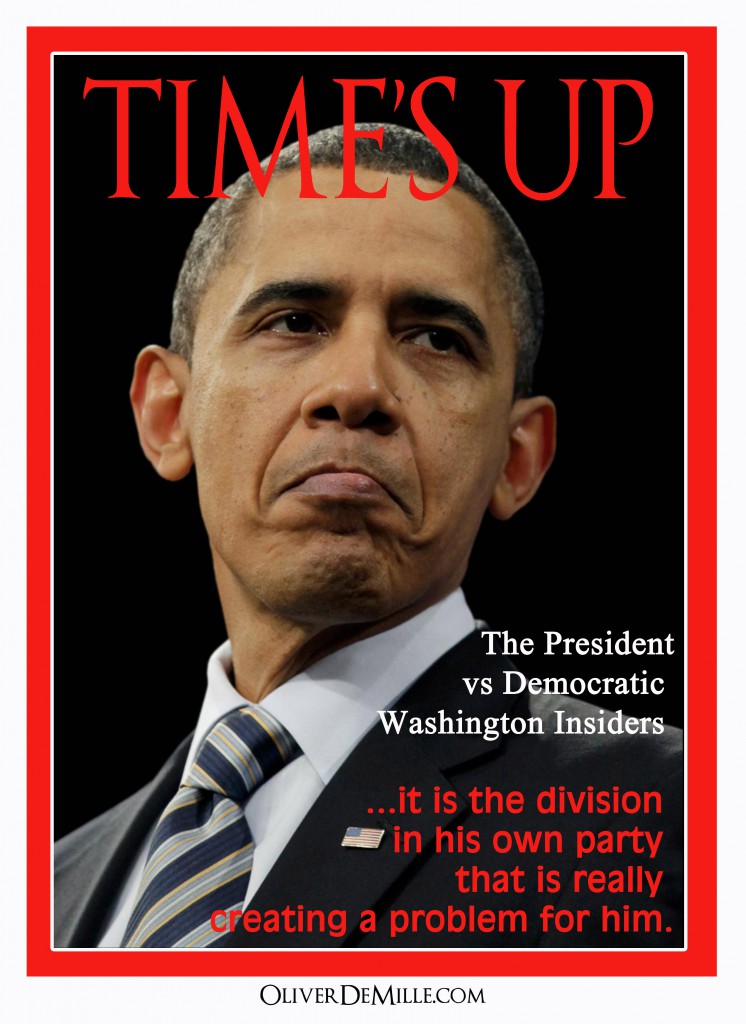 and certainly party disputes are a major part of our governance. But they aren’t the only conflict in play.
and certainly party disputes are a major part of our governance. But they aren’t the only conflict in play.
In fact, James Madison pointed out in Federalist 10 that freedom is protected when factions, parties, government branches, and even levels of government are pitted against each other.
When Democrats in the White House find themselves arguing with Democrats in the Congress, for example, or when House Republicans face off against conservative governors and other state- and local-level Republican officials, the normal power of partisan politics can be reduced.
Everyone tends to benefit when this happens, because it creates an additional check on any part of government seeking too much power.
If anything, it is unfortunate that this doesn’t occur more often.
Right now the Democratic Party is dealing with just such an internal battle. It takes the form of the President versus Congressional candidates who are running for office this year and need to break from the White House in order to get enough votes. Also the President versus Hillary Clinton and other potential Democratic presidential candidates who are trying to build their own following.
It also includes the President versus various Democratic Washington insiders who feel that his more controversial policies are hurting the Party. And the President versus past members of his administration, current members who keep “leaking” inside scoops to the media, and the usually liberal media that is now pressing the President more aggressively than at any point since his election in 2008.
Fighting Allies
In short, it seems to be the President versus a lot, if not most, of his own Party—not just in Washington but in many states and locales as well.
George Will noted that the President has faced strong opposition among his own party in a number of major crises during the past year. Such conflicts include sharp criticism about the failures of the Obamacare website, the Snowden revelations about government spying on its own people, the IRS scandal, the White House “negotiating with terrorists” and swapping prisoners with the Taliban, the President’s seeming weakness in dealing with Putin and the Ukraine, the controversial EPA rules, Democratic opposition to Presidential appointments (e.g. Larry Summers), Democratic resistance to the President’s attempts to use force in Syria, etc.
All in all, the President’s own party is rendering his policy agenda and even his responses to national crises very difficult. Oh, and no surprise, the Republicans are doing their part to oppose him as well. But it is the division in his own party that is really creating a problem for him—the word popping up now in the press is “incompetence” or “a lack of presidential competence.”
Most national Democratic leaders are quick to verbally support the President in conversations with Republicans, but among their constituents and on Capitol Hill they are increasingly going their own way. Even when it directly conflicts with the Administration.
As the elections heat up for 2014 and in preparation for the big one in 2016, many Democrats are finding that Obamacare and perceived problems with the Obama Administration are hurting them among voters. They are naturally distancing themselves from the Oval Office, and this trend is spreading.
Lasting Wisdom
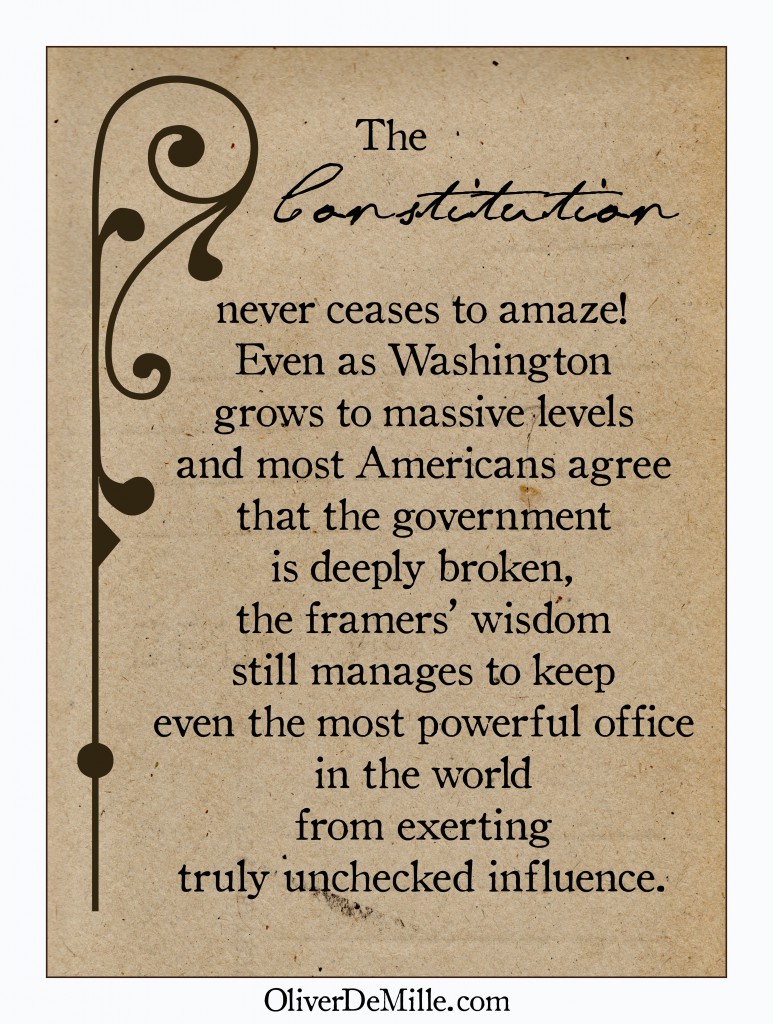 Madison wanted a divided government (3 branches competing against each other, as well as the state and federal levels closely watching the excesses of the other), and the constitutional system is at least partially still working in this way. To have Democrats checking Democrats and Republicans checking each other brings an extra smile to many independents. If a Republican were in the White House, a major international crisis could bring the GOP together in support of the President, but it doesn’t seem likely that anything similar will help President Obama. In fact, international affairs seem to be the focal point of the Democratic divisions.
Madison wanted a divided government (3 branches competing against each other, as well as the state and federal levels closely watching the excesses of the other), and the constitutional system is at least partially still working in this way. To have Democrats checking Democrats and Republicans checking each other brings an extra smile to many independents. If a Republican were in the White House, a major international crisis could bring the GOP together in support of the President, but it doesn’t seem likely that anything similar will help President Obama. In fact, international affairs seem to be the focal point of the Democratic divisions.
The most powerful “Tea Party” work seems to be occurring among a growing number of Democrats who are committed to checking what they consider to be excesses of the current Administration.
The Constitution never ceases to amaze! Even as Washington grows to massive levels and most Americans agree that the government is deeply broken, the framers’ wisdom still manages to keep even the most powerful office in the world from exerting truly unchecked influence. This must be frustrating to those in power. Bravo Madison, Dickinson, Franklin and all your colleagues. Bravo!
Of course, if the framers were here today, they’d no doubt point out that this will only last so long. If we don’t become the kind of citizen-leaders they were, we will lose the rest of our freedoms—sooner rather than later.
(If you haven’t read Oliver DeMille’s new book, We Hold These Truths To Be Self-Evident, this is a great place to start! This may be one of the most important books so far in the 21st Century. It is truly a Must Read!)
 Oliver DeMille is the New York Times, Wall Street Journal and USA Today bestselling co-author of LeaderShift: A Call for Americans to Finally Stand Up and Lead, the co-founder of the Center for Social Leadership, and a co-creator of TJEd.
Oliver DeMille is the New York Times, Wall Street Journal and USA Today bestselling co-author of LeaderShift: A Call for Americans to Finally Stand Up and Lead, the co-founder of the Center for Social Leadership, and a co-creator of TJEd.
Among many other works, he is the author of A Thomas Jefferson Education: Teaching a Generation of Leaders for the 21st Century, The Coming Aristocracy, and FreedomShift: 3 Choices to Reclaim America’s Destiny.
Oliver is dedicated to promoting freedom through leadership education. He and his wife Rachel are raising their eight children in Cedar City, Utah
Category : Blog &Citizenship &Community &Constitution &Culture &Current Events &Government &Leadership &Liberty &Politics

